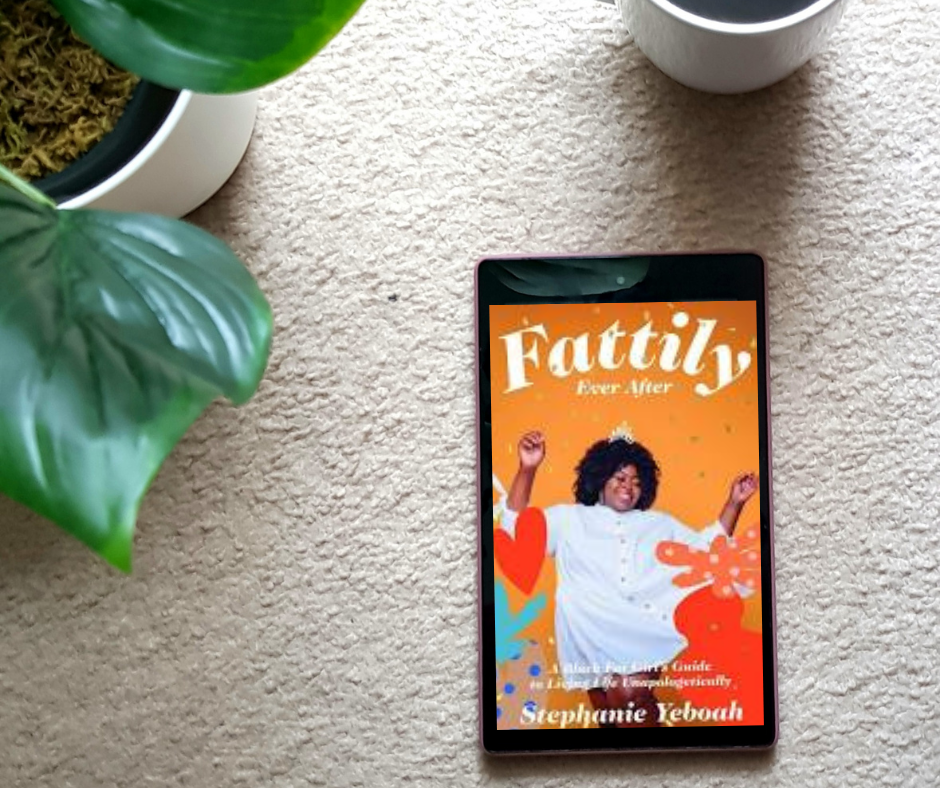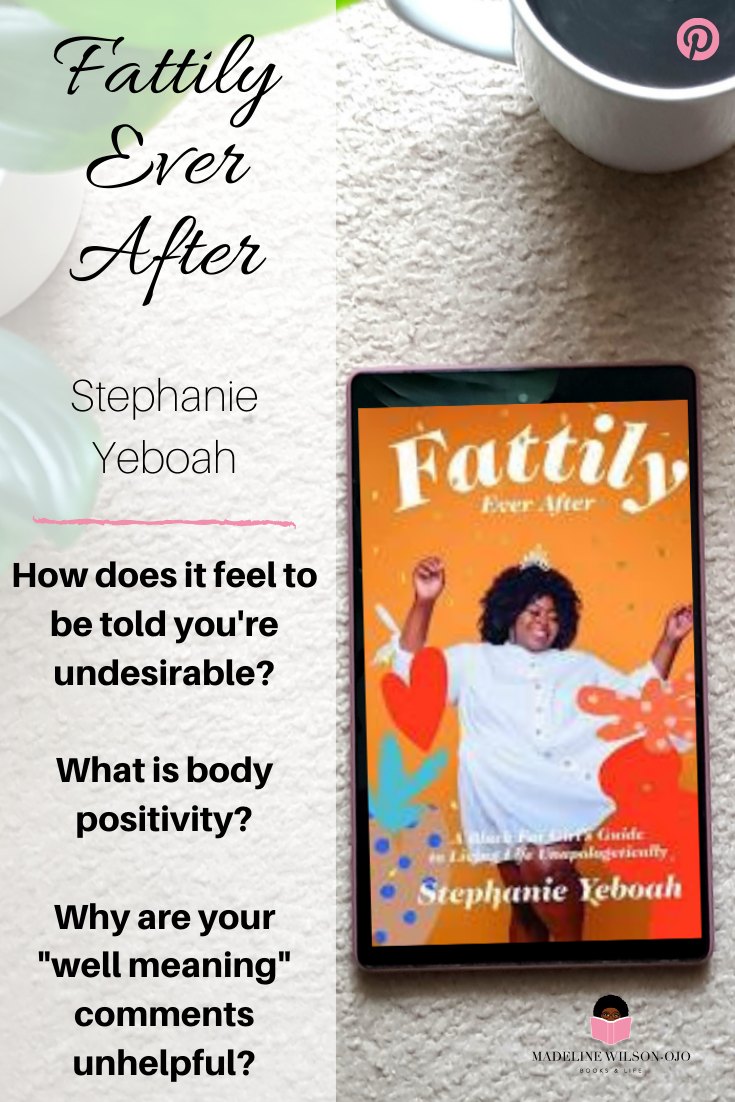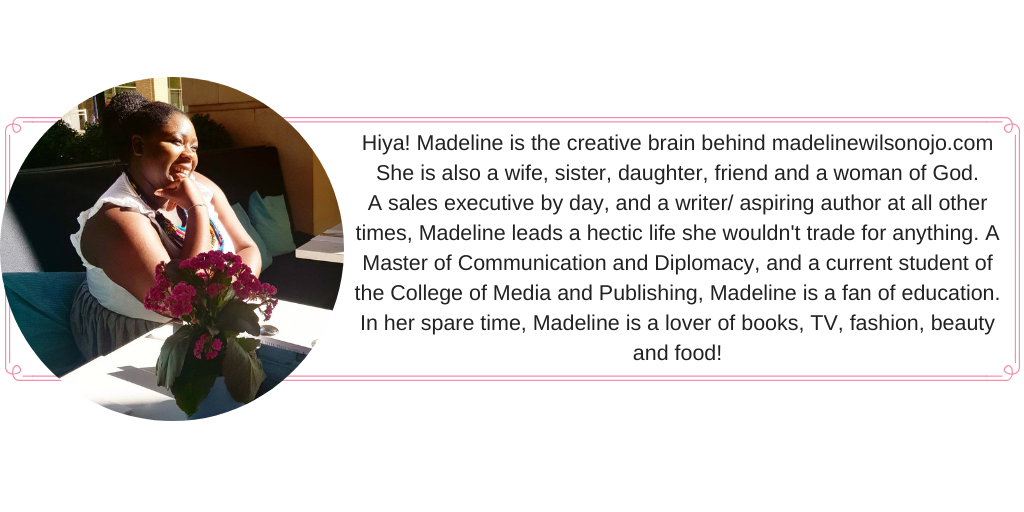Imagine growing up in a world that inherently views you as ugly? Or trying to find your place in an industry which consistently rejects you based on the way you look? I mean, whether, you’re black, white, slim, thick, blonde, or brunette, I am sure we’ve all had days when we feel insulted by the mirror. But for some, this is a crippling daily reality – and for Stephanie Yeboah, who is a fat black woman, this reality formed an important part of her life story, so much so, she has written a book about it.

I cannot remember when or how I came to know Stephanie (not personally, but you know, through the interwebs), but I have followed her journey over the years and watched as she publicly dropped her alias, Nerd About Town in favour of her real name. In that time, she has juggled quite a few roles: YouTuber, blogger, nine-to-fiver, freelance writer, and now author (please, I am not a stalker, I just know these things). In that time, two things she has consistently been passionate about are fashion and fat acceptance. And oh, sis has levelled up!
A fact of life?
I must admit, I probably could have identified with her a bit more as a fellow fat black woman, who is also Ghanaian British, in the same age group, and from Saaf London. But I initially found myself getting impatient with Stephanie’s constant lamenting over being trolled and feeling undesirable because of her appearance. “She’s making us all look pathetic”, I used to think to myself. That was until the day I read, in a series of tweets, about how a seemingly lovely date turned out to be a nasty “pull a pig” trick of which she was the victim. Men can be cruel at times! You can read the gory details here (or you can grab a copy of the book and read it there!)
“But you didn’t forget to eat though”
“If it was chicken and chips you’d find it though”Being fat in a black household is real character building.
— M 👩🏿💻✒ THE COPYWRITING BLUEPRINT (@madelinewblogs) June 5, 2020
Honestly, this unfortunate incident stilled me. I slowed down and tried to understand Stephanie’s predicament a little more. Suddenly, I found myself in admiration of her. She had bravely shared what was a very humiliating occurrence with millions of readers and had in the process started many conversations about the insidious way in which the fat, black woman is viewed and treated; about the pressure men are put under to perform laddish behaviour in front of their peers; about the highs and lows of dating, and so on and so forth. These different discussions that were happening in tandem made me look back at my own life experiences, and admit to myself the discrimination that I had silently accepted and had put down to “a fact of life”.
You may also want to read: Book Review | Slay in Your Lane
You may also want to read: How to Support Black British Writers
So when Stephanie announced she was writing a book about being a fat black woman in the UK, I was excited. I had read books about navigating life as a woman, and books about life as a black person in the UK, but never about being fat in a world where slimness is celebrated, and certainly never where all three intersect. I knew I needed to read Fattily Ever After.
Fattily Ever After, what’s it about?
Is it an autobiography, a motivational read for fat black women, or an educational resource for those who live outside of blackness and fatness? I would say it’s a cool mix of all three. Stephanie subtitles it “A Black Fat Girl’s Guide to Living Unapologetically”. She begins by detailing the harrowing experiences of primary and secondary school bullying, trying to reconcile her love for fashion with the contempt she had for her body, the lack of media representation, and the abject sadness she felt, all of which went unnoticed by her family.
She then goes on to deconstruct the desexualisation and hypersexualisation of fat, black bodies. I learned why representation matters as I read about Hattie MacDaniel, the first black person to win an Oscar, who was also a fat black woman. I discovered how her role of “Mammy the maid”, which she won the accolade for, sustained the “mammy figure” racial trope you find in many contemporary Hollywood films, and how this has been compounded by black male actors such as Tyler Perry, Eddie Murphy and Martin Lawrence, who all at some point have donned grotesque fat suits, wigs and makeup to portray and attract more ridicule to fat black women. (Don’t get me wrong, at the time I laughed along with everyone too). In all this, Stephanie argues the need for diverse black storytelling.
Download your 200 Instagram Highlights Cover!
As Fattily Ever After develops, what becomes clear is the in-depth research that has gone into this body of work. Stephanie thoughtfully shares the history of the body positivity movement, gives an analysis of statistics pertaining to back women and eating disorders, and explains why scientifically, the BMI chart is so flawed. She also generously tells so much more about her personal battle with disordered eating, her struggles with corsets and waist training, and coming to terms with the fact that she didn’t have the “typically African” shape. (You know, the full chest, tiny waist and backside for days!)
My personal thoughts
Having almost reached the end of Fattily Ever After, I must say I have thoroughly enjoyed this book. So far, I connected most with her stories of how her Ghanaian family were ill-equipped to handle her fatness with sensitivity. “…This is why you’re gaining weight. Ayeeeeee OBOLOBO!!”, Stephanie recounts some of the ridiculous remarks issued to her by family members. (Obolobo is a Twi word meaning ‘fat’ by the way – and one I have heard more times than I care to count). I have reflected on what living fattily ever after means for me: self-love, and living a happy, full life with all the flab, all the belly fat and all the chub rub!
Fattily Ever After is made up of the right balance of anecdotes (you need to read the case of the lopsided bum pads!) and in-depth analysis to keep one’s interest piqued. Not only that, the pages are gracefully littered with colourful, abstract illustrations of fat black women. She has included real-life examples of some of her Twitter interactions with trolls and has reinforced her messages with interviews with other fat black women.
View this post on Instagram
Scratching the surface
This is a rich body of work. The text is diverse and layered, and for that, I really appreciate the book. Her tone is at times, humourous, sometimes emotional, and other times, very “adongivafock”. Although Stephanie insists Fattily Ever After is “A Black Fat Girl’s Guide to Living Unapologetically”, she has written for the non-fat and non-black who wishes to be an ally and those with fat friends in their circle. Without coddling, her writing points out and corrects some of their harmful albeit well-intended actions and instructs them on how they can better lend their support. I can’t say I agree with all of her suggestions – some are a bit finicky for me. I mean, “it’s always better to say ‘that outfit looks great on you!’ instead of ‘you look great in that’“. Really Stephanie?! However, I do appreciate the education she lends to others and this makes Fattily Ever After a book for all.
When it comes to Black British writing, especially where it centres on our real-life experiences, I believe we are just scratching the surface. We are at the very beginning of voicing out, and as a book that centres on the fat black woman, this makes Fattily Ever After important.

The fact is society will be society, and some of us won’t be losing weight any time soon. But that’s not the point, is it? The point is everyone deserves love, respect and dignity regardless of appearance. This is the underlying message I get from Stephanie’s writing. My final thought is that I recommend all women pick up this book, not only as a form as self-love and care but also as an educational resource and an entertaining read.
Enjoyed this review? Read Finding My Fattily Ever After here.

